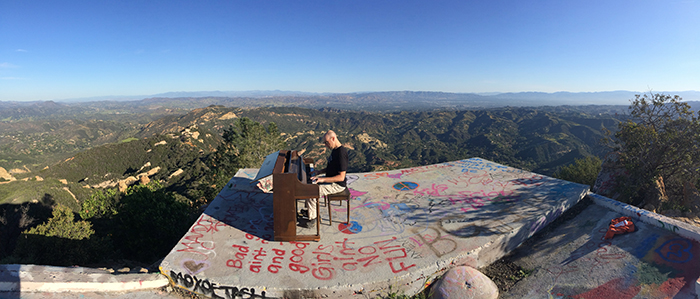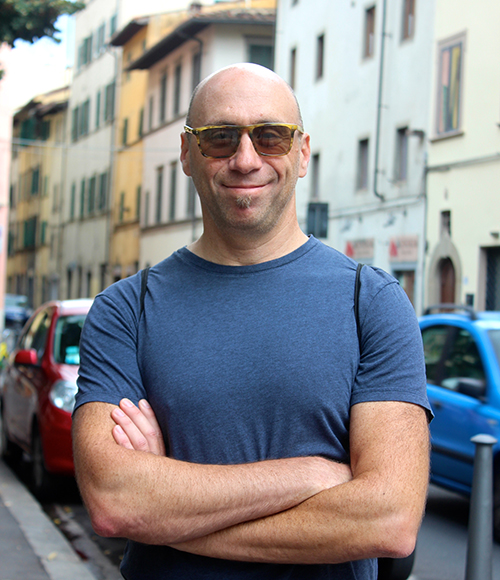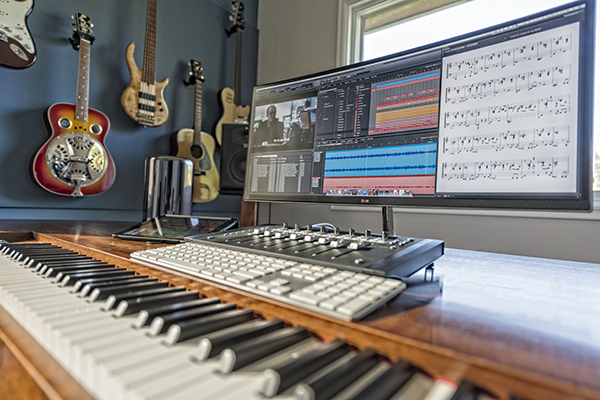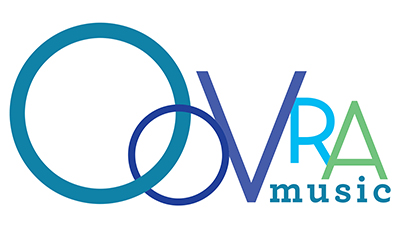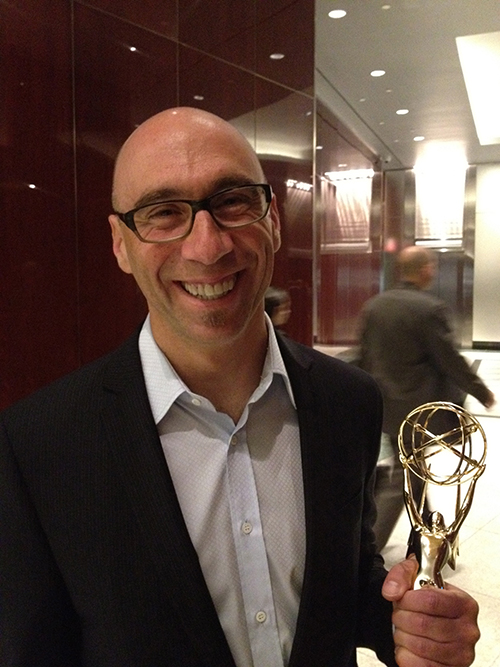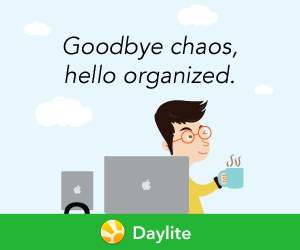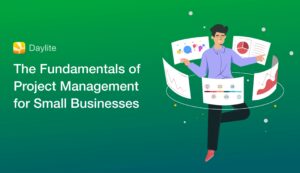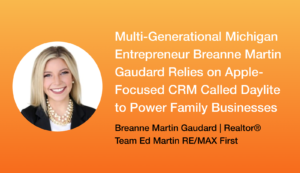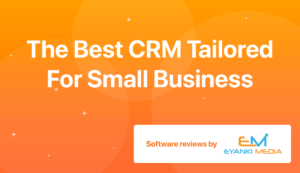Music plays an essential and often influential role in in how we experience TV and film. It can elicit discomfort and anxiety, preparing you for a terrifying surprise. It can make your heart sink and your eyes swell up with tears as the story takes a tragic turn for the worst. Or it can cause your heart to beat faster and faster, building into a crescendo of inspiration and excitement as the scene’s climactic triumph unfolds. Through melody, harmony, instrumentation and rhythm, a good score will enhance the emotions present in each scene, and sometimes even tell the viewer how to feel. For Joel Goodman, creating the music that triggers these emotions is what he lives for.
Joel is an Emmy-winning composer for motion pictures who lives in Los Angeles. He composes music for TV and film and has scored 4 Oscar-nominated films, over 25 Emmy-nominated television programs and documentaries, and over 100 total films and TV shows. Joel has also been in the music licensing business since 2001 when he co-founded MusicBox and used Daylite to manage his business. He’s now starting another music licensing business, Oovra, and is using Daylite as an integral part of this venture. We interviewed Joel to learn how Daylite as his CRM and Project Management tool has helped him from one business to the next, and to take a deeper look into the life of an Emmy-winning composer.
What do you love about composing music?
Joel Goodman: Well, how many days do you have? It’s one of those things that I’m always thinking about it. It’s a practice and it’s a business. But for me what I really love about it is the collaboration. I don’t sit in an ivory tower by myself writing a piece of music. I write a lot of music for television and film that involves collaborating with producers, directors and editors, as well as with my own team of musicians and recording engineers. There’s a lot of community in it, which is a wonderful thing. I feel like I’m the luckiest person in the world to get to collaborate with all these amazing people. It’s a strange thing when your dream comes true.
I also love that when you sit down and create something that has never existed before, you get into this space of experimenting and problem solving. It’s a bit like a puzzle. Sometimes I try to focus and capture where that first bit of inspiration comes from. Even when I am being conscious of what’s happening, it’s still sort of this strange thing that just naturally…happens. I love the mystery of it. Ultimately it becomes a form of self-expression that goes far beyond what people can express in words.
When did you turn your passion into a business?
Joel: I started off like a lot of other teenagers wanting to play in a rock and roll band. I went to college and studied performance and composition. I came out of school and made my living as a musician for a few years. Then I had an opportunity to write music and be paid for it! After that first opportunity it was 5-6 months later when I was offered a position to work in New York as a full time composer. Like so many things in life, we set out to do something and then all these other things happen. The path ends up changing. We don’t always choose it, sometimes it chooses us.
What was it like making the decision to go out alone?
Joel: I worked for 7 years writing commercial music primarily for TV commercials. During that time I got my own projects writing music for documentaries and feature length films. There was a natural transition where I had enough work to take the leap. It was probably one of the scariest moments of my professional career.
I really wanted to see the company I was working for expand into different areas. I was close with the owner so I spoke to him about it. He gave it some thought but decided they wanted to stay focused in commercial advertising. It wasn’t working for me to do that in the long term so that was the trigger for me to do my own work. My path was moving in another direction so I felt I had to take that step.
What has been your favourite project?
Joel: There are so, so many. I always think about the very first project I did, My Knees Were Jumping. It was also my first film that premiered at the Sundance Film Festival, so that was very special because it was two firsts. Sitting down and writing an hour’s worth of music can be a very scary prospect, especially in the beginning. It was a proof of concept for myself to say that I could do this. There have been a lot of special projects along the way though, not just one.
There’s 3 recent projects that are favorites because I feel like I’m getting better and moving towards a place of being truer to myself. One is a narrative film that premiered in September called Dirty Weekend that stars Matthew Broderick. It’s directed by Neil LaBute and he’s a fantastic writer and director.
The next would be a 4-hour TV show that I scored for the American Experience series called Walt Disney. It’s the life of Walt Disney and it’s absolutely fascinating. I’ve always found Walt Disney to be a very interesting individual. He was an incredibly creative person. What the Disney studio achieves in the beginning is all due to his artistic vision coupled with his sense of innovation. He’s a little like Elon Musk and Steve Jobs rolled into one. When you work on a film that has almost 3 hours of music in it, it’s a big job so it has to be special.
The third one that comes to mind is a film coming to HBO next year called Claude Lanzmann: Spectres of the Shoah. An Englishman in Toronto named Adam Benzine made this film about Claude and about his creation of the film, Shoah. It’s just incredible. It’s a fantastic film and I’m very proud of the music created for it.
What’s your process for getting into the zone of writing?
Joel: The best way I can explain it is to “get out of the way”. You need to allow space for things to happen. It’s a form of meditation where you empty your mind and allow a space for these ideas to exist. That doesn’t mean I’m sitting on the floor in lotus position. In a way it is like yoga or meditation because it’s definitely a practice. It’s something you work at and open up your mind to what works for you.
I typically watch the film once as a viewer, then I get a set of notes from the director about where the music should happen and I watch the film again while going over those notes. Then I sit down with the director and we watch the film together. By then I’ve seen the film 3 times and spent a lot of time with the director talking about the film. At that point I step away and I use that time and that space to create a place for other ideas to come. I know some people who do this and then go for a long walk or take a nap. There needs to be some space before you sit down to write. After that, you dig in.
How did you find out about Daylite?
Joel: I have a bit of history using CRMs and project management software but when I first started it was all paper and pencil. I owned a music licensing company from 2001-2011 called Music Box and somewhere around half way through that time we started using Daylite. We were all Mac-based and it looked like a great solution. We really loved working with it. Then Music Box was acquired by another company and I took some time off from the music licensing world. Now that I’m getting back to it I needed a program. I looked at what was out there and everything else was online. SalesForce, Insightly, they’re all online. That wasn’t the best solution for us. I was really happy to see that Daylite was still out there. We’re a team of three using Daylite. I started a trial and everyone took to it like a fish takes to water. It’s worked out really well.
How were you using Daylite for your prior business?
Joel: Daylite was primarily used by sales people who were keeping tabs on prospects. Following up with them, setting calendar items to stay in touch with people in appropriate intervals. It was also great for them to use as a system to communicate between sales and accounting when licenses were being paid. At that time I used Daylite for reporting methods. I’d go into Daylite and see how many people someone called in a particular day or week. We could forecast revenue coming in. We were using it in a lot of different ways. For me I mostly used it for a managerial view of the company. Now with this new business, Projects, Tasks and Opportunities are key for us. Looking at Daylite on the sidebar, we’ve made great use of every one of these things.
How are you using Daylite for your new business?
Joel: We’re starting a new music licensing company called Oovra. The doors for the business aren’t open yet. I’m trying to start doing it the right way and get the proper work done before we open up shop. Right now we’re populating the database by putting our Forms in place and using Letter Templates for legal documents and emails. We’re already using it to help us keep track of projects and become more efficient. Even though there’s only a few of us, we’re pretty scattered about geographically. So we’re using Daylite as sort of a communication tool. If a task comes up I can just delegate it to someone and it pops up on their Mac or iPhone. So far it’s been really efficient for us in every way. The Mail integration is really key also –that’s how most of the business happens. Right now we’re building our database. We’re having some client interactions and getting clients that want to work with us before we’re even open which is great. The real tasks will come once the business starts.
We use Daylite in a sales capacity and we also use it as a project management tool. We have a lot of different projects going on that involve multiple people. It’s a little different than your typical office project as this involves liaising between directors, producers, musicians, and recording engineers. We manage both companies in one database because we wear many hats and it’s good to keep it in one place. Permissions become an important part. Sales people don’t see certain things and production people don’t see the same things that sales people do.
What are your favorite Daylite features?
Joel: For me, it’s seeing relationships between people and within other companies. The way you can link everything together is great. Taking Notes is big for me, and I love the Task feature too, especially being able to see my tasks in my calendar.
We use Forms for production. When working with music licenses there are some set things that need to go in the database so we use Forms to organize this. We can then export the Form to anyone outside of Daylite who needs it.
Another feature that will help us move forward is the Mail Merge feature. We have some Letter Templates for licenses, invoice requests, etc. When we’re interacting with our clients, it’s very personal. So it’s unlikely that we’d ever have a letter in there. But there’s a lot of other “paper work” that doesn’t have to become paper by using the Letter Templates.
How did you find the process of getting started with Daylite?
Joel: Instead of importing all our previous contacts as a VCard or .CSV file, we’re actually manually adding them in as we need. I find you end up spending a lot of time deleting contacts, so this way we’re starting fresh and only adding the people in Daylite that we know need to be in there. Whoever is the owner of that contact goes through and adds a Category and Keyword, and whatever else needs to be in there, that way all the info we need about a contact is captured because it happens when they’re created.
How have you customized Daylite for your business?
Joel: A big part of our business is everyone interacting online. We’ve added custom fields to each person’s contact record for Linkedin, Facebook, Twitter,etc so we can just quickly click the link and see what these people are up to. I’d really love to see Daylite with more social media integration so we can see a feed of these online interactions right in Daylite.
What advice would you give to someone starting a business?
Joel: Having done this a few times and now starting another new business, I sat with this for a while. I was trying to figure out what I wanted to do next. What I realized was that I needed to know why I wanted to do it. When you really know why you’re doing what you do, everything falls into place. It answers the questions of what you do and how you do. The “whats” and “hows” are functional and necessary. But the biggest differentiator and what brings happiness to most people, is understanding “why”. When you know why you’re doing something, great things can happen.
Why do you do what you do?
Joel: I feel like we’re in the golden age of documentaries and filmmaking. It’s so important to tell these stories. Whether it’s a person’s biography, studying why society does certain things, or something that’s just fun, these are all types of films that tell an important story. I believe in storytelling and I believe in the marriage between music and stories. It enhances and changes people’s lives. It changes how we look at things. There’s a greater cause and I get to be a part of it through music.
